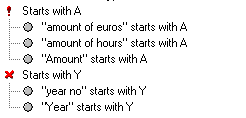Difference between revisions of "Custom SQL Rules"
m (→Create Rules) |
|||
| Line 32: | Line 32: | ||
== Executing rules == | == Executing rules == | ||
CaseTalk, when validating, will create a temporary table where this script can insert records. After execution CaseTalk will present the result in the validation panel / window. | CaseTalk, when validating, will create a temporary table where this script can insert records. After execution CaseTalk will present the result in the validation panel / window. | ||
[[File:Customrulesresult.png]] | |||
== SQL Requirements == | |||
Revision as of 15:49, 23 January 2018
Custom SQL Rules
This feature enables the custom sql scripts to be defined by users to execute arbitrary sql when validating the model for well-formednes is started. Once this feature is activated and the user has created a sql script for it, the result will be shown in the model validation panel / window.
Create Rules
CaseTalk already contains a lot of rules to check the validity of the information model. However since opening up the custom attributes, the use may have the need for more validation rules.
For instance a custom attribute may be defined to help users in the administrative tasks of maintaining a large model. Fact Types need approval, etc. A status attribute might provide for such administration.
Secondly a need may arise to validate the model for approvals. For these kind of examples, a custom rule could be defined in custom SQL.
In the main menu Repository \ Custom Rules.. can be selected to create rules. The default example contains:
INSERT INTO $SCHEMA$.CustomRules SELECT 'Starts with A' as name, '"' || otftname || '" starts with A' as message, 'OTFT' as repositoryType, otftname as repositoryID, 0 as status FROM $SCHEMA$.OTFT WHERE otftname like 'A%' UNION SELECT 'Starts with Y' as name, '"' || otftname || '" starts with Y' as message, 'OTFT' as repositoryType, otftname as repositoryID, 1 as status FROM $SCHEMA$.OTFT WHERE otftname like 'Y%';
Executing rules
CaseTalk, when validating, will create a temporary table where this script can insert records. After execution CaseTalk will present the result in the validation panel / window.
